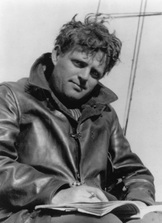The famous American adventure writer, Jack London, visited Korea during the war, I just learned. He was there immediately after the early fighting ended in spring 1904. Jack London is, of course, most famous for The Call of the Wild and White Fang, both also written in the early 1900s. He was 28 at the time of his sojourn through Korea. He died at age 40, the same year that my grandfather was born.
London produced an essay about his time in Northeast Asia. His observations and thoughts about Japan, Korea, China, and Manchuria are in an essay semi-ironically entitled “Yellow Peril“. I came to read this essay recently:
[Written by Jack London, 1904]
In many a lonely [Korean] village not an ounce nor a grain of anything could be bought, and yet there might be standing around scores of white-garmented, stalwart Koreans, smoking yard-long pipes and chattering, chattering — ceaselessly chattering. Love, money, or force could not procure from them a horseshoe or a horseshoe nail.
“Upso,” was their invariable reply. “Upso,” cursed word, which means “Have not got.”
So, Jack London heard “upso” so often that he discussed the word itself. As I say, the word is banmal, or low-speech. It immediately made me think that these Koreans of 1904 were surprisingly rude to this poor foreign sojourner.
This use of “low-speech” would most likely have gone along with condescending/rude behavior, which may explain London’s wildly negative opinion of Korea.
In fact, though, as always, it’s hard to judge the past by the standards of the present. It is. In the old days, when it was called “Chosun”, I’ve read that low-speech was used much more “rigorously”. Any yangban (a member of the old Korean aristocracy, 10% of the population) had to to address members of the lowest Korean social classes using this “low-speech” I’m talking about, regardless of relative age or social achievement. This led to the ridiculous and sad situation of even yangban *children* using low-speech to address grown men, even elderly men, of the lowest classes. (Members of the lowest classes had to address yangban in the most-polite form of speech.)
What kind of Koreans did Jack London meet? He was inquiring about supplies during his horseback trek through Korea to report on the war. Were they all village elders? If so, they still would’ve felt compelled by the then-fading Chosun social system to address a younger man (and a foreigner, at that) using low-speech. This is understandable.
I remember the last sentence I heard from them. It was a friendly but certainly-low-speech form of bidding farewell,“Jal Gah!” [“잘 가!”]. I heard it after I’d said a polite goodbye [“안년히 가세요!”] as I was walking off onto a side trail and they were continuing on the main trail. I didn’t mind hearing low-speech from them; as I say, it’s more natural in a situation like ours of hugely divergent ages. They were all very kind. They were well-prepared with food and drinks (even alcohol) and shared with me generously. There was never any “upso” with them.


Hi, I somehow came to your blog while searching for information on Jack London. thanks for the interesting post. I was wondering if you know anything about Japan paying for the reports written by foreign reporters back then, because the depiction of the annexation by Jack London seemed somehow crafted to me. Also I read somewhere that there are evidence that some foreign reporters were paid to justify the annexation during Japan’s occupation of Korea, often emphasizing that Korea was benefiting from the annexation, with no negative reaction from the Koreans. Anyway just curiosity here.